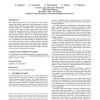194 search results - page 35 / 39 » Learning to rank query reformulations |
204
click to vote
VLDB
2008
ACM
16 years 1 months ago
2008
ACM
The evolution of computing technology suggests that it has become more feasible to offer access to Web information in a ubiquitous way, through various kinds of interaction device...
106
click to vote
WWW
2003
ACM
16 years 2 months ago
2003
ACM
Traditionally, when one wants to learn about a particular topic, one reads a book or a survey paper. With the rapid expansion of the Web, learning in-depth knowledge about a topic...
130
click to vote
KDD
2004
ACM
16 years 2 months ago
2004
ACM
We propose a new unsupervised learning technique for extracting information from large text collections. We model documents as if they were generated by a two-stage stochastic pro...
122
click to vote
WSDM
2009
ACM
15 years 8 months ago
2009
ACM
The ranking function used by search engines to order results is learned from labeled training data. Each training point is a (query, URL) pair that is labeled by a human judge who...
137
click to vote
CIKM
2010
Springer
15 years 10 days ago
2010
Springer
Ranking Web search results has long evolved beyond simple bag-of-words retrieval models. Modern search engines routinely employ machine learning ranking that relies on exogenous r...

